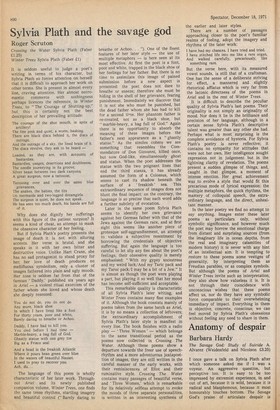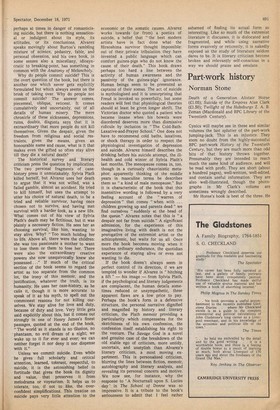Anatomy of despair
Barbara Hardy
The Savage God: Study of Suicide A. Alvarez (Weidenfeld and Nicolson £3.25) I once gave a talk on Sylvia Plath after which someone asked me if I was a voyeur. An aggressive question, but perceptive too. It is easy to be too impressed by extremist experience, in and out of art, because it is wild, because it is radical and blasphemous, because it most honourably touches bottom. The Savage God's praise of articulate despair is perhaps at times in danger of romanticising suicide, but there is nothing sensational or indulgent about its style, its attitudes, or its conclusions. Alvarez speaks movingly about Burton's rambling mixture of science, pedantry, fable, and personal obsession, and his own book, in some senses also a miscellany, idiosyncratic to breaking-point, has something in common with the Anatomy of Melancholy.
Why do people commit suicide? This is the overt question of the book, but there is another one which never gets explicitly formulated but which always seems on the brink of taking over. Why do people not commit suicide? The answer comes, piecemeal, oblique, reticent. It comes cumulatively and uncertainly, out of all details of human misery. The mere chronicle of these sicknesses, depressions, ruins, doubts, disgusts says that it is extraordinary that more people do not kill themselves. Given the despair, given the freedom from religious and social restraints, given the means, given an honourable name and cause, what is it that makes even the gifted so often stay alive till they die a natural death?
The historical survey and literary criticism press the question by implication. The two personal fragments of casehistory press it unmistakably. Sylvia Plath killed herself, but Alvarez uses her death to argue that it was not willed, was failed gamble, almost an accident. He tried to kill himself, but uses the attempt to utter his choice of natural death, to be a tried and reliable survivor, having once chosen not to survive, and having met survival with a harder look, as a new life. What comes out of his view of Sylvia Plath's death may be fictitious, but it was plainly a necessary fiction. He sees her as choosing survival, like him, wanting to stay alive. Why? "Too much holding her to life. Above all, there were the children: she was too passionate a mother to want to lose them or them to lose her. There were also the extraordinary creative powers she now unequivocally knew she possessed ..." If much of the critical section of the book seems to regard the artist as too separate from the common lot, the irony of this memoir, and the justification, whatever the truth, is its humanity. He uses her case-history, as he calls it, though it is more accurate to speak of it as his myth, to spell out the commonest reasons for not killing ourselves. We stay alive for love and duty, because of duty and love. Very little gets said explicitly about this, but it comes out strongly in one of Henry James's finest passages, quoted at the end of the book, "The world as it stands is no 'illusion, no phantasm, no evil dream of a night; we wake up to it for ever and ever; we can neither forget it nor deny it nor dispense with it."
Unless we commit suicide. Even while he gives full scholarly and critical attention, learned, tolerant, respectful, to suicide, it is the astonishing belief in fortitude that gives the book its dignity and value, that preserves it from melodrama or voyeurism. It helps us to tolerate, too, if not to like, the overconfident simplifications. This treatise on suicide pays very little attention to the economic or the somatic causes. Alvarez works towards (or from) a poetics of suicide, a belief that "the best modern artists have in fact done what the Hirsoshima survivor thought impossible: out of their private tribulation they have invented a public language which can comfort guinea-pigs who do not know the cause of their death." This book draws perhaps too hard a line between the activity of human awareness and the passivity of the guinea-pigs' ignorance. Human beings seem to be presented as captains of their somas. The act of suicide is mythologised and it is unsurprising that Freud is invoked so powerfully, but some readers will feel that physiological theories should at least be given longer shrift. The Victorian doctor who quoted a patient who became insane when his bowels were disordered deserves more than dismissive ridicule by inclusion in "The Cold-BathLaxative-and-Prayer School." One does not have to recommend cold baths, laxatives, or shock therapy in order to respect the physiological investigation of depression and suicide. Alvarez himself describes the drinking before his suicide attempt, the illhealth and cold winter of Sylvia Plath's last months. The menopause comes in, too, though in a curiously chauvinistic metaphor; apparently thinking of the middle years in masculine terms he describes them as "a kind of male menopause." But it is characteristic of the book that this insensitive wording is followed by a very feeling account of the "warren of depression " that comes "when with ... children growing up and parents dead" we find ourselves "suddenly at the head of the queue." Alvarez notes that this is "a despair not far from suicide." A significant admission, for the experience of this imaginative living with death is not the prerogative of the extremist artist or the schizophrenic, but waits for us all Once more the book becomes moving when it touches ordinary endurance, the quotidian experience of staying alive or even not wanting to die.
If the book doesn't always seem in perfect control of its direction, if we are tempted to wonder if Alvarez is "hitching a lift" — his image — from Sylvia Plath, if the psychological and literary judgements are complacent, the human details sometimes reduced or unsympathetic, these apparent flaws are a low price to pay. Perhaps the book's form is a defensive structure, the personal narrative dignified and magnified by history and literary criticism, the Plath memoir providing a particularity which compensates for the sketchiness of his own confession, the confession 'itself establishing his right to the venture. The Savage God is a novel and genuine case of the breakdown of the old stable ego of criticism, more untidy, uncertain, and unstylish than Alvarez's literary criticism, a most moving experiment. This is personalised criticism, blurring the lines between fiction, memoir, autobiography and literary analysis, and revealing its personal concern and motive. We now see, for instance, why the response to 'A Nocturnall upon S. Lucies day' in The School of Donne was so impressive. It is a tribute to the book's seriousness to admit that I feel rather
ashamed of finding its actual form so interesting. Like so much of the extremist literature it discusses, it is dislocated and fragmented, and while using narrative forms evasively or reticently, it is nakedly exposed as the study of literature seldom dares to be. It is literary criticism become broken and relevantly self-conscious in a way we should praise and emulate.











































 Previous page
Previous page